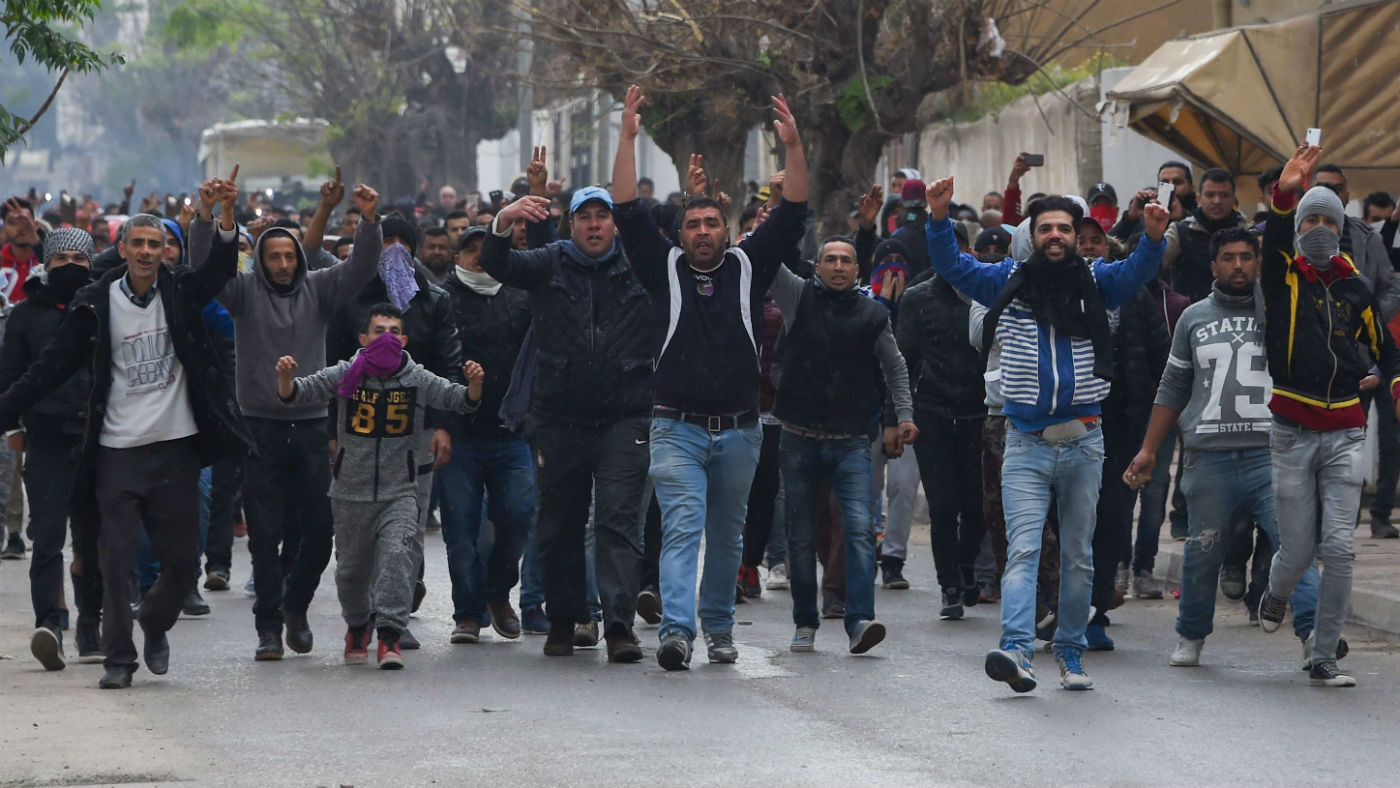Tunisia: 600 arrested in anti-austerity protests
Wave of demonstrations sweeps the North African country

A free daily email with the biggest news stories of the day – and the best features from TheWeek.com
You are now subscribed
Your newsletter sign-up was successful
Hundreds of protesters have been arrested in Tunisia as a wave of violent demonstrations sweep across the country.
More than 600 anti-government protesters were detained by police on the instructions of Prime Minister Youssef Chahed following three nights of rioting. There are reports the army has also been deployed to protect government buildings.
The immediate cause of the unrest is a new economic policy which will raise the cost of basic goods in order to cut a ballooning deficit and satisfy international lenders.
The Week
Escape your echo chamber. Get the facts behind the news, plus analysis from multiple perspectives.

Sign up for The Week's Free Newsletters
From our morning news briefing to a weekly Good News Newsletter, get the best of The Week delivered directly to your inbox.
From our morning news briefing to a weekly Good News Newsletter, get the best of The Week delivered directly to your inbox.
The International Monetary Fund, which lent the country $2.9bn (£2.1bn) in 2015, told Tunisia last December it needed to take “urgent action” and “decisive measures” to reduce its deficit, the BBC reports.
However, as with the protests that broke out in Iran after Christmas, longer-term factors behind the demonstrations “include high levels of poverty and youth unemployment, particularly among graduates”, says The Guardian.
The paper says January protests have recurred in Tunisia since the death of street-seller Mohamed Bouazizi in 2011 provoked a nationwide wave of anger that led to the overthrow of authoritarian leader Zine al-Abidine Ben Ali and kick-started the Arab Spring.
Since those heady days, and after authoritarian rule returned to many Arab countries, Tunisia has stood out as the one success story. But while it has been held up as a beacon of democracy in the Arab world, the past seven years have not been easy for the North African country.
A free daily email with the biggest news stories of the day – and the best features from TheWeek.com
It has had had nine different governments, economic productivity remains stubbornly low and unemployment has forced many young Tunisians abroad, fuelling the migrant crisis. It has also produced a disproportionate number of recruits for Islamic State.
-
 The Olympic timekeepers keeping the Games on track
The Olympic timekeepers keeping the Games on trackUnder the Radar Swiss watchmaking giant Omega has been at the finish line of every Olympic Games for nearly 100 years
-
 Will increasing tensions with Iran boil over into war?
Will increasing tensions with Iran boil over into war?Today’s Big Question President Donald Trump has recently been threatening the country
-
 Corruption: The spy sheikh and the president
Corruption: The spy sheikh and the presidentFeature Trump is at the center of another scandal
-
 Epstein files topple law CEO, roil UK government
Epstein files topple law CEO, roil UK governmentSpeed Read Peter Mandelson, Britain’s former ambassador to the US, is caught up in the scandal
-
 Iran and US prepare to meet after skirmishes
Iran and US prepare to meet after skirmishesSpeed Read The incident comes amid heightened tensions in the Middle East
-
 Israel retrieves final hostage’s body from Gaza
Israel retrieves final hostage’s body from GazaSpeed Read The 24-year-old police officer was killed during the initial Hamas attack
-
 China’s Xi targets top general in growing purge
China’s Xi targets top general in growing purgeSpeed Read Zhang Youxia is being investigated over ‘grave violations’ of the law
-
 Panama and Canada are negotiating over a crucial copper mine
Panama and Canada are negotiating over a crucial copper mineIn the Spotlight Panama is set to make a final decision on the mine this summer
-
 Why Greenland’s natural resources are nearly impossible to mine
Why Greenland’s natural resources are nearly impossible to mineThe Explainer The country’s natural landscape makes the task extremely difficult
-
 Iran cuts internet as protests escalate
Iran cuts internet as protests escalateSpeed Reada Government buildings across the country have been set on fire
-
 US nabs ‘shadow’ tanker claimed by Russia
US nabs ‘shadow’ tanker claimed by RussiaSpeed Read The ship was one of two vessels seized by the US military